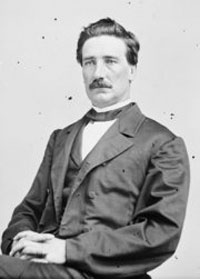
John Daniel Imboden (1823-1895)
John Daniel Imboden (February 16, 1823 - August 15, 1895) was a lawyer, teacher, Virginia legislator, coal mine operator, and a Confederate cavalry general and partisan fighter in the American Civil War.
Imboden, who pronounced his name "Im-BODE-en", was born near Staunton, Virginia, in the Shenandoah Valley. He attended Washington College (now Washington and Lee University), but did not complete his degree. He taught at a school for the deaf, dumb, and blind, and then attended law school and practiced law in Staunton. He was twice elected a representative to the Virginia legislature.

At the start of the Civil War, despite having no military training, Imboden received a commission as captain in the Staunton Artillery of the Virginia Militia, which he commanded at the capture of Harpers Ferry. While commanding an artillery battery at the First Battle of Bull Run, he perforated his left eardrum firing an artillery piece, causing subsequent deafness in that ear. On September 9, 1862, Imboden left the artillery to recruit a battalion of partisan rangers and was promoted to colonel of the 62nd Virginia Mounted Infantry (1st Partisan Rangers). He fought with Thomas J. "Stonewall" Jackson in the Valley Campaign at Cross Keys and Port Republic. He was promoted to brigadier general on January 28, 1863.
Along with Brigadier General William E. "Grumble" Jones, Imboden led the famous Jones-Imboden raid of 3,400 troopers into northwestern Virginia against the B & O Railroad, destroying railroad tracks and bridges and capturing thousands of horses and heads of cattle. The raid covered 400 miles in 37 days. In the Gettysburg Campaign, Imboden's brigade served under General J.E.B. Stuart as the rearguard for Robert E. Lee's movement north through the Shenandoah Valley. (His brigade did not participate in Stuart's wild adventure away from Lee's army, but instead raided the B & O Railroad in Bedford County, Pennsylvania.) They spent the Battle of Gettysburg guarding ammunition and supply trains in Chambersburg, Pennsylvania. During the Confederate retreat, Imboden was in charge of escorting the wagon trains of thousands of wounded soldiers back to Virginia. On July 6, 1863, the Potomac River was flooding at Williamsport, Maryland, and Imboden's wagon train was trapped. He put together a defensive force that included an artillery battery and as many of the wounded who could operate muskets. This hastily organized force turned back attacks from Union cavalry generals John Buford and Judson Kilpatrick, saving the wagon train. Robert E. Lee praised Imboden for the way in which he "gallantly repulsed" the Union cavalry.
Imboden returned to the Shenandoah Valley and commanded a brigade in Robert Ransom's cavalry division of the Second Corps of the Army of Northern Virginia under Jubal A. Early in the Valley Campaigns of 1864. He was incapacitated by typhoid fever and left the active cavalry service. He commanded Camp Millen, Georgia, and other prison camps in Georgia, Alabama, and Mississippi for the rest of the war. After the war he moved to Richmond, Virginia, and was employed as a lawyer and a coal mine operator in Washington County, Virginia.
John Imboden died in Damascus, Virginia, a town he founded while developing the local coal mining industry. He is buried in Hollywood Cemetery, Richmond, Virginia.